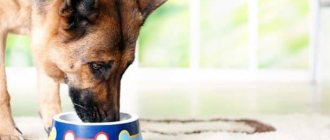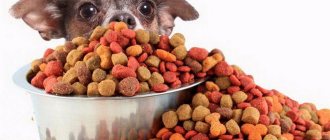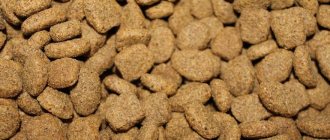In order for a tiny puppy to grow into a strong and healthy German Shepherd, it is important to properly organize its nutrition.
When preparing a diet, it is worth considering that the puppy has a small stomach and a fast metabolism, so it is recommended to feed it often and in small doses. You will also learn what to feed your puppy correctly at 1, 2, 3-4 and later months.
How to feed?
- For the first 14 days, the puppy is fully cared for by his mother, and he receives all the necessary nutrients and vitamins from her milk.
- Next, the breeder needs to gradually introduce complementary foods. At the same time, it is important to maintain a balance of nutrients so that the puppy does not develop hypovitaminosis.
- At 30 days of age, the puppy’s diet consists of 30-40% of bitch’s milk, and 60-70% of ready-made food.
First food
At two weeks of age, and if necessary earlier, complementary feeding begins using the following products:
- Low fat cottage cheese.
- Meat scraper.
- Special mixtures for complementary feeding.
Special mixtures for feeding newborn puppies are similar in composition to bitch's milk , so their correct use does not cause the risk of hypovitaminosis. Natural food is difficult to balance, so it is extremely important to monitor the puppy’s condition so as not to miss the onset of rickets or eczema.
After introducing complementary foods, puppies have a natural need for water, so there should always be a shallow bowl of water next to their house. If puppies cannot drink water on their own, then it is poured into their mouths using a pipette before each feeding. Boiled water is used.
Straight
When feeding Nauralka, it is recommended to introduce each new product gradually, and it is extremely important to monitor the reaction of the puppy’s body. If constipation occurs, the puppy is given a tummy massage and given dill water.
In case of loose stools, puppies are given rice water . If the stool does not return to normal within 24 hours, it is recommended to consult a veterinarian, since diarrhea can be a sign not only of indigestion, but also of a disease such as colibacillosis.
The product that caused digestive upset is excluded from the diet or given in a different form (boiled, steamed, mixed with other products).
From about 25-27 days, puppies are accustomed to porridge made from ground rice and buckwheat . A little later, grated vegetables and fish are introduced into the diet.
Which food is better?
High-quality food is the key to healthy development of a puppy. It is not recommended to buy economy or premium food, as they usually contain a lot of cheap, low-quality fillers. Dry food should be intended for feeding large breed puppies from a very early age. Almost every well-known manufacturer has such food in their assortment.
It is worth paying special attention to the composition of the feed: it should not contain corn or its processed products , and there should also be no vague formulations, for example, meat, vegetables, fat, etc. Ideally, both the type of meat and its percentage will be indicated (for example, dehydrated lamb meat - 17%, etc.).
You should not buy food in bulk, since pet store sellers often violate the rules and shelf life.
From what month can you be dry?
You can give dry food to puppies from two weeks of age . Before feeding, it must be soaked with water at room temperature or milk. It is recommended to give dry food to puppies over 1.5 months old.
Which food to choose: the best brands for shepherd puppies
If feeding your puppy natural food is troublesome, labor-intensive and you simply don’t have enough time, you can switch him to ready-made industrial food.
Dry food is often criticized. But you should understand that cheap products are criticized.
Expensive brands are made from quality products and are completely balanced.
All prepared foods are divided into 4 classes:
- Economy They contain little meat and offal, are “stuffed” with cheap fillers - corn, potatoes, etc., and include dyes and flavor enhancers. You need to walk around such products 3 kilometers away.
- Premium Better quality, but the level of meat in relation to plant components is low.
- Super premium. The best option in terms of price-quality ratio. Made in compliance with GOST standards, they contain everything necessary for feeding dogs.
- Holistic. The best option. Products are grown in environmentally friendly conditions. A number of feeds from this class are medicinal and are used in special diets.
If you choose what food to give your German puppy, you should pay attention to the following brands.
- Orijen "Puppy".
Balanced dry food for large puppies. A 6 kg package costs RUR 3,600.- Acana "Puppy Large Breed".
Designed for large breed dogs from 2 to 12 months. Price for 11 kg – 6000 rub.- Royal Canin German Shepherd Junior.”
Specially designed for German babies up to 15 months. But be careful: this food contains allergens and is not suitable for all dogs. For 12 kg you will have to pay about 5,000 rubles.- Blitz Puppies Fresh Duck & Chicken All Breeds
is a 100% natural Italian puppy food from the Blitz Holistic line for dogs. Grain-free, high in meat and with the right balance of vitamins and minerals. One of the best in terms of price-quality ratio. It will cost 4500-5000 rubles. per package 12 kg.
The dosage for each food is individual. It is indicated on the packaging. You can slightly reduce or increase the volume based on the puppy’s appetite - whether he is full or remains hungry.
Diet by month
When using ready-made dry food, there are no difficulties with the diet: all recommendations for feeding and portion sizes are indicated on the packaging. But those who prefer to feed German Shepherd puppies natural food usually have many questions. Below you will find out what you can feed one month old, two month old and older puppies.
- At the age of 1 month, the puppy is fed 6 times a day. 30% of the diet should consist of meat (lean beef), and the rest should be dairy products and plant foods. From dairy products, it is recommended to give cottage cheese, kefir or yogurt. Vegetables – grated stewed carrots or zucchini. You can give one-month-old puppies chopped lettuce and spinach. It is recommended to cook porridge from ground buckwheat or rice. Give a boiled egg yolk or quail egg once a week.
- At the age of 2 months, puppies already become more developed and eat well on their own, so meat and vegetables can be cut into small pieces rather than grated. Gradually, you can introduce boneless boiled sea fish, chicken, apples and pears into your diet. It is recommended to start cooking porridge from whole grains. It is important to remember to provide dairy products daily.
- At the age of 3-4 months, the puppy is fed the same foods with the addition of various offal: beef heart, liver, kidneys, udder, tripe, chicken stomachs, etc. Doses of offal should be small, and it is recommended to give them no more than 1-2 times a week.
- For cheeks at the age of 5-6 months, the number of feedings is reduced to 3 times. The same products are used, but you can diversify the diet with bananas, bell peppers, tomatoes and cucumbers, a small amount of cheese, berries (strawberries, blueberries, plums) and steamed oat bran.
- Puppies over 6 months old are fed 2 times a day. The same products are used.
For clarity, below is a table of the diet of a German Shepherd puppy by month.
| Puppy age, months. | Number of feedings | Recommended Products |
| 1 | 6 | Beef, cottage cheese, kefir, curdled milk, carrots, zucchini, lettuce, spinach, boiled egg yolk. |
| 2 | 5-6 | Beef, chicken, fish, cottage cheese, kefir, yogurt, carrots, zucchini, apples, lettuce, spinach, boiled egg yolk. |
| 3-4 | 4-5 | Beef, chicken, fish, offal, cottage cheese, kefir, curdled milk, carrots, zucchini, apples, lettuce, spinach, boiled egg yolk. |
| 5-6 | 4-3 | Beef, chicken, fish, offal, cottage cheese, kefir, curdled milk, carrots, zucchini, apples, pears, bananas, strawberries, blueberries, plums, lettuce, spinach, boiled egg yolk, oat bran. |
| Over 6 | 2 | Beef, chicken, fish, offal, cottage cheese, kefir, curdled milk, carrots, zucchini, apples, pears, bananas, strawberries, blueberries, plums, lettuce, spinach, boiled egg yolk, oat bran, oat bran. |
Principles of feeding puppies
The physical development of German Shepherd babies lasts 15 – 18 months. From birth to 1.5 years, they increase their mass 80 times. Peak weight gain occurs in the first 4 months.
Therefore, it is important to carefully consider all aspects of your tailed pet’s nutrition. The puppy must develop harmoniously. Excessive thinness, as well as excessive obesity, lead to diseases of internal organs, bones and joints, and the condition of teeth, skin, and wool worsens.
The volume and composition of each portion is controlled. Any supplements (treats, vitamins) are selected based on the needs of the animal: they take into account what is missing in the daily menu and what is needed for the baby’s development.
General rules
For the first 10 days of a German Shepherd puppy's stay in a new home, he is fed what the breeder gave him.
After a week and a half, the menu is changed if desired. Do this gradually so as not to upset digestion.
Adhere to the following recommendations:
- the portion should be enough for one sucker: if the pet eats it too quickly and licks the bowl for a long time, there is not enough food, if it does not finish within 20 minutes, there is too much;
- products – at room temperature or lukewarm;
- after the meal, the bowl with food is removed, even if the dog has not finished eating;
- water must be constantly available, it is changed 3–5 times a day;
- You need to walk your pet immediately before feeding or 1.5 - 2 hours after eating, as bloating and intestinal volvulus are possible;
- always feed at the same time;
- they don’t give food at night;
- the break between evening and morning feeding should not exceed 8 hours;
- if the puppy lives in an apartment, then after eating he wipes his face with a handkerchief - if this is not done, the pet will “wash itself” on the sofa, sheets and bedspreads.
It is important to feed the little “German” only from a bowl. You can give treats from your hands, but do not force him to pick up food from the floor. This is how a bad habit is developed, and during a walk the pet will “wool” the ground in search of a tasty morsel.
Requirements for place and bowls
The “dining room” for the dog should be equipped in a secluded place. This way she won’t be afraid that her food will be taken away.
It is advisable to buy special metal or nickel-plated bowls on a stand. Their height is adjustable so that the puppy’s head is parallel to the floor during meals.
Otherwise, curvature of the spine, neck, and joints of the front legs is possible. In addition, the baby will swallow air, which will cause gas formation and bloating.
Bowls are washed every time after eating. You can put a rubberized mat under them - it will prevent the dishes from slipping and trap pieces of food that the puppy will inevitably scatter.
Up to a year
From birth until the age of one year, the puppy actively grows. Therefore, it is extremely important to follow the recommended diet so that the German Shepherd grows up healthy and strong, with a beautiful breed exterior.
Basic principles of feeding a puppy up to one year old:
- Maintaining a balance of all nutrients.
- Maintain intervals between feedings according to age.
- Monitor portion sizes: the puppy should not overeat, but starvation will have an adverse effect on its growth and development.
- Food should be at room temperature.
- Fractional meals.
Up to 6 months, it is recommended to give German Shepherds food in the following proportions::
- 10% of the entire daily allowance - dairy products;
- 10% - vegetables;
- 10-20% – vegetables and cereals;
- everything else is meat and meat by-products.
Meal place
The eating area must be properly equipped. It is better to purchase a special stand for the bowl so that you can adjust the height of the stand as the puppy grows. The dog should not tilt its head low while eating, this can cause a curved spine. The normal neck tilt is 60 degrees. The front legs are straight. At the same time, they should not slide while eating, so you need to lay a rubberized mat on the floor where the puppy eats.
A dog bowl should be made of quality materials. The best option is stainless steel. Fired ceramic will also work.
The puppy should always have access to fresh water. It is necessary to monitor its cleanliness and change it whenever it gets dirty. It is advisable to pour clean water three times a day. Drinking water is given at room temperature. After each meal, dog dishes should be washed thoroughly.
After a year
When the shepherd reaches the age of 1 year, the number of feedings is reduced to 1-2 times a day. You can use either dry food for dogs over 1 year old, or the natural food that the shepherd ate as a puppy.
At the age of 6 years and older, a dog is considered elderly ; physiological changes begin to occur in its body. For example, metabolism slows down and physical activity decreases. Therefore, the dog requires a special low-calorie, low-protein diet.
What to avoid in the diet of a month old shepherd dog
Here the rules of care and feeding remain unchanged:
- low-quality products;
- factory products with various additives;
- food with spices;
- overfeeding with vitamins;
- hot or very cold food;
- boiled potatoes;
- tubular bones;
- sweets, sausages, smoked meats;
- sorrel;
- overfeeding or underfeeding;
- "treats" from you and your friends.
Drying can only be used at one feeding per day
Attention! At such a young age, you cannot feed your baby only dry food, no matter what super class it is.
It may contain components that cause severe allergies. “Drying” only as a substitute for the 1st of 6 daily feedings.
Daily norm
The daily amount of dry food is indicated on the packaging. If the dog eats natural food, then the daily norm is calculated as a percentage of its weight:
- 6-7% under 6 months of age;
- 3-4% over 6 months of age.
Since among German shepherds there are both active representatives of the breed and couch bumpers, it is necessary to focus, first of all, on the appearance of the dog :
- if her ribs are sticking out, then you should increase the portion;
- If she quickly gains fat, it is recommended to give her less food.
Eating whims or developmental transition period
If your baby willingly eats one type of food and refuses another, do not indulge such whims. Otherwise, you will have to feed your German Shepherd only what he wants. As a rule, it will be unhealthy or even dangerous food.
Reasons for refusal
On the 25-30th day of development, taste reactions in shepherd dogs become more acute. If before this period the puppy relied more on smell, now taste complements the range of sensations.
During this period, it is especially important that the food offered is neither hot nor cold, nor bitter, nor spicy, etc. Otherwise, the shepherd will associate the smell of this type of food with an unpleasant sensation in the mouth and refuse to eat THIS for a long time.
The second reason is that after this meal the baby felt sick, and he associated the malaise with the taste and smell of this food.
The third reason is that the puppy is not hungry by the time of feeding.
He would happily chew some “yummy” food, but you will do the right thing and don’t offer any “yummy” food instead of real food, so as not to teach him to be capricious and pick at food.
You can’t force feed, but you also don’t need to change food “at the request of the workers.”
If your pet refuses to eat, do not follow his lead.
In 10 minutes. After discarding what is in the bowl, put its contents in the refrigerator. At the next feeding time, you will reheat and serve the same food again.
From one month onwards, you can skip one feeding without harming the health of the growing dog.
By the way, you shouldn’t worry that your puppy’s menu is too monotonous: your pet can do just fine without culinary delights, which can lead to gastritis. Gastritis in German shepherds whose feeding regimen was not followed is a frequent phenomenon, its development is asymptomatic, the course is severe, even fatal.
Your dog only needs systematic, proper feeding at regular intervals!
A one-month-old shepherd dog is fed 6 times, timing the time with the general daily routine in the house. For example, the first portion is at 6 am, and the last at 21.00: 6.00 – 9.00 – 12.00 – 15.00 – 18.00 – 21.00. Small deviations in one direction or another are allowed for no more than half an hour.
Why doesn't he eat well?
There are many factors that influence loss of appetite:
- Changing teeth.
- The dog ate grass or pieces of stick bark on the street.
- The dog is too spoiled with treats.
- Picky eating is inherited.
- Heat.
- The presence of any disease.
Attention! If, in addition to loss of appetite, there is decreased activity, drowsiness, restless behavior, diarrhea or vomiting, the puppy should be taken to the vet immediately.
Mode
The following simple rules will help you raise a healthy and beautiful dog:
- firmly maintain balance;
- Do not feed only meat;
- excess calcium, vitamins D and A can lead to volvulus;
- the share of proteins in the daily diet cannot be lower than 30 percent (without meat, a dog will not gain muscle mass, and its bones will be too thin);
- You should not overfeed your baby under any circumstances.
During the first seven days, the puppy continues to be provided with the same food as in the kennel, otherwise he will most likely develop diarrhea. A single portion should be of such a volume that the dog can eat it completely. If he licks the empty bowl for a long time without moving away from it, it means he hasn’t had enough. However, the supplement should not be given immediately. It is better to simply draw the appropriate conclusion and increase the portion a little at the next feeding.
Breakfast is offered to the baby no later than 7 am. In the evening, the last snack before bed is organized around 10 o'clock.
Is it possible to give bones and what kind?
It is recommended that German Shepherd puppies be given bones as they help sharpen and clean their teeth and also massage their gums.
But not all bones can be given to a puppy. Sharp tubular bones, which a dog can easily chew, can damage the larynx, esophagus and stomach with their fragments. Therefore, it is strictly prohibited to feed dogs chicken and rabbit bones .
Dogs can be given:
- Tubular bones of beef or lamb.
- Beef moslaki or large joints.
It is not advisable to give boiled bones , since heat treatment changes the structure of the bone tissue, and as a result they are poorly digested.
And a little about products for dogs
In order for your pet to be healthy, beautiful and feel great, you need to balance its diet so that the growing body receives everything it needs. It's no secret that a dog is a predator, although to a lesser extent than a cat. Therefore, for a dog, the main source of energy and everything else is proteins. And only then come fats, carbohydrates, minerals, fiber and vitamins.
Proteins for a puppy
The main source is animal products, that is, meat. It can be given either raw or boiled. Still, give preference to raw, as it provides everything your puppy needs.
The baby will happily scratch his gums on the sugar bone, but at an older age the bones are already dangerous - they can injure the intestines and stomach.
As for fish, in principle you can treat your dog to it a couple of times a week, but only sea fish - raw or boiled, without bones. Fish products wash out vitamin B, resulting in intestinal upset, growth retardation, dandruff, and weakening of the name system. Finally, fish tend to accumulate heavy metals, which will cause banal poisoning.
Cottage cheese is an excellent source of protein, but raw eggs are poorly digestible. Moreover, raw protein can cause dermatitis. Therefore, if there are eggs, then boiled or in the form of an omelet. Milk, kefir, yogurt, etc. you can and should give. They are offered either raw or cooked as milk porridge.
Fats for dogs
This is also an important element. Moreover, the German Shepherd needs both animal and vegetable and milk fats. A sign that the animal has enough of everything is smooth, shiny fur.
A baby needs 2.6 grams of fat per 1 kg of weight per day. Add animal fats to soups and cereals. Sometimes it can be replaced with butter. The dose for a puppy up to 3 months will be 10-15 g, for a six-month-old puppy - 20-25 g per day.
And vegetable fats contain valuable unsaturated acids. They increase the puppy’s resistance to various diseases, stimulate rapid growth, normalize metabolism and have a positive effect on the circulatory system.
Carbohydrates
This is an important component that provides energy and stimulates the gastrointestinal tract. These are starch, sugar, fiber, and simply - cereals, fruits and vegetables. And if for some reason there is not enough fat in the dog’s diet, then the amount of carbohydrates is increased proportionally. Semolina is given under supervision, because it makes the puppy gain weight very quickly and become loose. And overfeeding rolled oats can cause inflammation of the anal glands.
It is not advisable to give fresh bread to any dog. In the stomach it will form a sticky lump, which will slow down the digestion process. Instead, treat your dog with crackers, but in moderate doses, and starting from 2 months.
Sprouted grains are a very healthy product, and giving your dog one tablespoon of them a day will be very helpful. If necessary, you can also make vitamin flour: sprout the grains, dry them, and grind them.
But it’s better to forget about all legumes, as they are very poorly and take a long time to digest. This is heavy food for a dog.
Dogs eat almost all vegetables and fruits well . But there are small exceptions:
- Potatoes - only raw and as a delicacy
- Cherry - weakens
- Zucchini, cabbage - puchat
- Sorrel is dangerous for dogs, causing gastritis and even death.
Water for dogs
The water quality requirements for dogs are the same as for humans. The only thing is not to constantly feed your puppy boiled water, as it can have a negative effect on the teeth. And teach your shepherd not to drink from puddles and various bodies of water - he can easily pick up some kind of infection.
How to give gelatin?
To strengthen cartilage and prevent the development of joint diseases, many experienced German Shepherd breeders recommend giving puppies gelatin daily. Most often, ordinary food gelatin is bought for these purposes and soaked in water, or a tablespoon of powder is poured directly into the porridge.
In pet stores you can find special vitamins with gelatin, for example, Kanvit (calcium + gelatin) or Gelacan Baby (collagen hydrolysate). But they should be given strictly in accordance with the instructions. It is advisable to first consult a veterinarian.
We create a menu from natural products
It is acceptable to feed your pet food suitable for humans. However, you cannot give him food from the master’s table - the dog’s digestive system works differently.
In order for your shepherd to eat properly, you need to plan your diet. Food should include a balanced amount of carbohydrates, proteins, fats, and vitamins.
Up to a year, a shepherd puppy should receive food in the following ratio: half of the diet is dairy products, a quarter is offal or meat, the rest is porridge, soups, stews.
Carbohydrates are a source of energy for the shepherd and help maintain subcutaneous fatty tissue, which is responsible for maintaining heat.
These nutrients are found in foods such as:
- cereals (buckwheat, pearl barley, oatmeal, millet, semolina, barley, rice, corn);
- fruits (apples, pears, bananas);
- vegetables (cucumbers, tomatoes, cabbage, zucchini, pumpkin, bell peppers, carrots, beets, eggplants);
- honey;
- dates, dried apricots.
Foods high in sugar should be given rarely and in small quantities. Honey can be added to porridge or dairy dishes.
Potatoes cannot be used as a base for dog food - they have minimal nutritional value, but contain excess starch and simple carbohydrates. The pet will not receive energy from such food.
Proteins are responsible for the condition of the dog’s muscle mass and the functioning of internal organs. The gastrointestinal tract of shepherd dogs is adapted to digest protein fibers, so they tolerate such food well.
Rich in protein:
- meat and minced meat (pork, beef, lamb, chicken, turkey);
- offal (hearts, liver, lungs, kidneys);
- legumes (beans, peas, chickpeas);
- dairy products (kefir, cottage cheese, plain yogurt, fermented baked milk);
- chicken eggs;
- fish.
Excess fat can cause excess weight. But you can’t give up these nutrients - they are beneficial for the dog’s blood vessels, organs, and fur. A lack of fatty acids can lead to diseases of the skin, eyes, liver, heart, and reproductive system.
It is useful to give your puppy the following foods:
- animal fat (chicken, lamb, pork, fish);
- oils (sunflower, flaxseed, corn, olive, butter);
- cottage cheese;
- liver;
- pine nuts.
It is better to start the first complementary feeding with such simple food:
- fermented milk products without additives;
- porridge with a little salt;
- vegetable stew;
- boiled meat, eggs.
Later you can experiment with food: omelettes, soups, stews, porridges with the addition of vegetables and meat.
Expert opinion
Anna Abramenko
An avid dog lover. Experience in veterinary medicine since 2009.
Ask a Question
Dogs that eat natural food from childhood are unpretentious when it comes to food. However, when adding a new product to the diet, you need to monitor the shepherd’s reaction. Often fruits, vegetables and some types of cereals cause allergies or indigestion.
What vegetables are allowed?
Not everything that is beneficial to humans provides similar benefits to dogs. For example, some vegetables can cause severe digestive upset in your German Shepherd puppy .
- Recommended vegetables for feeding dogs include: carrots, pumpkin, zucchini, bell peppers, cucumbers, sweet potatoes, asparagus, turnips and radishes.
- It is strictly forbidden to give dogs potatoes, broccoli, legumes, eggplant, garlic and rutabaga.
- Give tomatoes, cabbage (only stewed), and beets with caution.
Correct position when feeding
The shepherd dog has grown significantly in one month and stands confidently on all 4 legs - it’s time to get used to eating from a bowl located on a stand.
It is important to teach this position while eating from an early age so that the baby does not develop the habit of throwing food out of the bowl and picking up pieces from the floor - one, and his exterior is correctly formed - two.
It will be difficult, but possible, to wean him off from picking up pieces, and it will be impossible to correct the hunchback, high hindquarters and weak front pasterns.
The bowl should be at the height of a one-month-old puppy’s chest so that he can only put his muzzle in there. Place a rug made of thick fabric under the shepherd's paws so that the baby's paws do not move apart and the rug itself does not slide on the floor surface.
Special bowl for feeding shepherds
As the German Shepherd grows, the height to which the bowl is raised should also “grow”.
Healthy cereals
- One of the healthiest cereals is buckwheat. It has a positive effect on the dog's metabolism. It also contains leucine, which is an excellent preventive measure for liver disease. But it is recommended to give buckwheat porridge with caution, as it can cause allergies in some dogs.
- Rice stimulates digestion and is perfectly absorbed by the body. It is often prescribed for poisoning, allergies and diseases of the digestive system.
- Many German Shepherd owners cook oatmeal for their pets.
However, oatmeal or flakes can cause an eating disorder, and in sedentary dogs, obesity. It is recommended to give oatmeal only in combination with buckwheat or rice.
The life and health of a German Shepherd puppy directly depends on its owner. Failure to follow nutritional recommendations for puppies, feeding low-quality cheap food, and eating prohibited foods for your dog can lead to the development of various diseases.
Feeding frequency and portion size
There are no universal advice on caloric intake. Each dog has an individual metabolism.
In addition, pets receive different loads: some spend almost no energy, while others actively consume calories.
They adhere only to general recommendations regarding the volume of dishes. They can be slightly reduced or increased.
The approximate feeding scheme for “German” puppies is as follows:
| Age in months | How many times to feed per day | Volume of one serving |
| 1-2 | 6 | 200 ml |
| 2-3 | 5 | 300 ml |
| 3-6 | 4 | 500 ml |
| 6-10 | 3 | 0.75-1 l |
| from 12 | 2 | 1-1.5 l |
It is worth considering that puppies have a faster metabolism and a small stomach. Therefore, they are fed fractionally: often and in small doses. Pieces of food should be small and the consistency should be mushy.
First vaccinations
While the cubs are breastfed, it makes no sense to vaccinate. Their immunity is protected by their mother's antibodies. All basic vaccinations must be completed no earlier than two months.
NOTE!
If vaccination is carried out ahead of time, the puppy’s immunity will be undermined and will be unstable throughout the animal’s life.
An exception is made only if the puppies were abandoned by their mother or kept in inappropriate conditions. Then vaccination against parvovirus enteritis and distemper is done as early as possible.
For one-month-old puppies, use the drug “Nobivak pappy”.
Care and education
Caring for a month-old four-legged tomboy includes the following items:
Training
A four-week-old puppy is still too young to learn complex tricks. Sometimes he can be too sloppy, spreading trash and food around the house or relieving himself right on the carpet.
This is what you should start working on.
Already at this age, commands such as “fu”, “no”, “place” and “come” can be introduced into everyday use . Use them in a playful way, do not forget to reward the puppy with treats and affection for obedience.
This will strengthen his attachment to you, and the execution of commands will be fixed in his head with pleasant associations.
Do not raise your voice and under no circumstances raise your hand to the baby. Separation from your mother at one month of age is already a lot of stress.
Excessive pressure or cruelty from a person can turn a frightened puppy into an aggressive adult whose character will be very difficult to correct.
Place for a dog
If you plan to keep a dog outside, equip in advance a spacious enclosure with an insulated booth, in which the pet can fit even when it grows up.
The roof should not leak . If you plan to keep your dog in an apartment, buy a dog bed and place it away from drafts and heating appliances.
A one-month-old puppy is still very attached to his mother, and therefore at first he may whine and call her.
Don't scold him for this - pet him, calm him down and give him a toy . This will help you strengthen the owner-dog bond.
Walk
You can teach him to relieve himself on the street immediately after all the important vaccinations have been completed.
CAREFULLY!
To begin with, 2-3 short walks of 5-10 minutes will be enough.
Gradually the time can be increased.
Water treatments
A German Shepherd needs to be washed three times a year, with the exception of winter. Immediately after bathing, dry your pet thoroughly and let him dry at home, away from drafts.
To keep the coat looking healthy, brush your dog at least once a week using a special brush with coarse bristles.
Carefully monitor the condition of your eyes - they should be clean and clear, without tearing or discharge . To prevent the development of conjunctivitis, periodically clean them with a swab soaked in chamomile infusion.
Also, don’t forget about the ears, even though they are still hanging. Once a month, wipe them with a cotton swab dipped in a special lotion.
To relieve itching during teething and at the same time protect furniture from damage - purchase special rubber toys.
Height and weight
The following table shows the physical parameters of a one-month-old shepherd puppy depending on gender:
| Gender of the animal | Height at withers | Chest circumference | Weight |
| Bitch | 19 cm | 28 cm | from 3 to 3.3 kg |
| Male | 21 cm | 31 cm | from 3.5 to 4.2 kg |
Don't be alarmed if these values fluctuate by a few centimeters or grams.
The puppy is constantly growing, and its body is fully formed by 12 months, and its indicators stabilize by 3 years of age.
Possible menu option for a 2-month-old puppy
A serving is 200 g.
- Cottage cheese with the addition of kefir;
- A serving of milk porridge;
- A serving of porridge on water with additional meat (50g) and boiled vegetables;
- Boiled beef or chicken meat and porridge (100 g each);
- Any option with the addition of vitamin supplements.
The composition of the products varies while maintaining the principle.
Vitamins and supplements
If a shepherd puppy is naturally fed, additional medications are needed to maintain the norm of nutrients, vitamins and microelements in its body.
They are required during special periods of a shepherd’s life: during illness, pregnancy and feeding. Nutritional supplements are available in the form of tablets, capsules, gel, drops, powder, suspension.
There are mono-additives (with one active component) and poly-additives (a complex of useful substances).
There are different classifications of drugs:
- by age (for newborn puppies, teenagers, old animals);
- on the problem (for fur, teeth, improving organ function, increasing immunity).
During periods when your pet's health may weaken, it is useful to add vitamin and mineral supplements to his food. The most important vitamins for a puppy’s body are vitamins A and D.
Their complex has the following properties:
- strengthens the immune system;
- improves the condition of the skin, claws and coat;
- has a positive effect on vision;
- promotes proper bone development;
- stimulates metabolism;
- muscle formation.
Vitamins must be given during the period of active growth of the puppy. For better absorption, they should be consumed with food.
Vitamin E improves the absorption of fats, helps normalize hormonal levels and has a beneficial effect on heart function. For good health, a shepherd dog needs potassium, calcium, zinc, sodium, and phosphorus.
Expert opinion
Anna Abramenko
An avid dog lover. Experience in veterinary medicine since 2009.
Ask a Question
In vitamin-mineral complexes, doses and effective tandems of active substances have already been calculated. Your veterinarian can recommend the most appropriate medications for your puppy.
One of the most versatile supplements is bone meal, compressed into a tablet and rich in calcium and phosphorus. For general health, dogs consume yeast and dried seaweed. The preparations also include herbal powders, dry proteins and lipids, and amino acids.
Supplements are mixed with food so as not to attract the puppy's attention with an unfamiliar object. If your pet refuses to eat such food, you can purchase a vitamin treat in the form of a bone, slices or jelly tablets.
Dry food for German Shepherd puppies can be supplemented with fish oil capsules, and in winter with vitamin D.
Prohibited Products
In terms of food, shepherds are unpretentious dogs, but some foods can be dangerous to their health.
- Sugar, sweets, raisins and grapes. Sweets, cookies, chocolate and other sugar-containing treats damage teeth and cause obesity and diabetes.
- Milk – causes diarrhea and interferes with calcium absorption.
- Raw fish can cause infections and parasites.
- Mayonnaise, ketchup, mustard, vinegar, etc.
- Fried foods can lead to obesity.
- Citrus fruits are often the cause of allergies.
- Plums and peaches cause indigestion.
- Avocado. Many animals like its taste. But this source of healthy fats can be harmful to your pet's health. Persin is a toxin, a few grams of which cause stomach upset and vomiting.
- Walnuts and almonds. Dogs are unable to digest nuts (with the exception of pine nuts and peanuts). In addition, almonds contain toxic acid that can cause acute poisoning.











